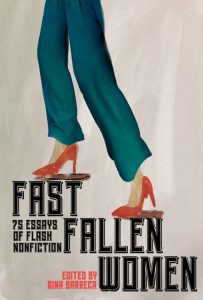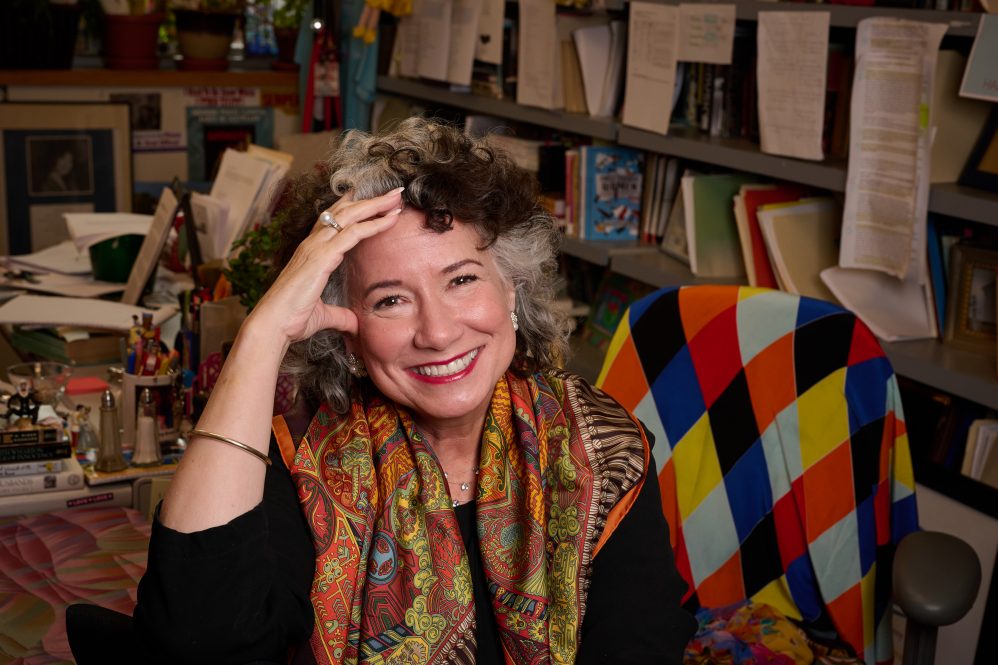Gina Barreca keeps candy in her office, but Kit-Kats aren’t why former students keep in touch.
There’s a reason 125 UConn English majors and minors are members of the private Facebook group “Gina’s Greatest,” where they post job openings, offer advice, and wait for the day Barreca, Board of Trustees Distinguished Professor in the English department, pops in to say hi.
Maybe creative writing students are drawn to her class because she simply gives them permission – like her father did when dropping her off at Dartmouth College and told his Mona Lisa Vito, “You don’t like it, you take the next bus home.”
Maybe it’s because she bans electronic devices in class – yes, for all 150 minutes – almost requires students to learn each other’s names, and in the process develops a close-knit community that genuinely begins to care for one another.
“It’s not because they owe me money,” she quips.
OK, maybe it’s the humor and quick wit on which she’s built a career and reputation.
Whatever the reason, Barreca has a following and wants to help those students – current and former – in the same way she says her teachers helped her: “They almost literally saved my life. So, I have a naturally high opinion of many educators, from my favorite teacher in high school to the ones I had in college and graduate school. And what they all told me was to make sure to follow through when I was able to give back.”
Lately, that’s meant giving UConn-connected writers a book with an actual ISBN in which to publish their work.
A big ask and a big yes
Emma Corby ’21 (CLAS) says Barreca didn’t even have her new email address after graduation from UConn. Luck, happenstance, fate, maybe good timing prompted Corby to contact her favorite former professor for reading suggestions as she advanced in her graduate program at the University of Alaska Fairbanks.
“I must have taken six or seven of Gina’s classes at UConn. I always needed one on my schedule,” Corby says. “Once I took one, I was addicted. I would leave her classes feeling smarter every day. Where else can you find that?”
Right away, Barreca sent Corby at least 15 book suggestions, along with a big ask: Would she like to write a piece for a collection of essays Barreca was compiling for a new book project?
Duh. Of course. Yes, please.
“You can see how big I’m smiling,” Corby says as she grins from ear to ear. “It’s a world that I never really pictured myself living in, and I feel so lucky and so happy.”
Corby had months, then only days to produce her essay “Emerald Shoes,” while Erin Brochu ’21 (CLAS SFA) didn’t need quite the same lead time for “Good as Nude,” an essay she’d produced for class one semester and Barreca remembered.
“It’s a little bit of a what-happens-in-Vegas-stays-in-Vegas story that’s now published for everyone to see,” Brochu jokes. “So, my first reaction when Gina asked if she could use it was ‘Oh God, of course this one.’ But seriously, I was very excited when she sent the email. English was a second path in my life that I wasn’t necessarily expecting.”
Brochu says she always was attracted to the performing arts and when a go at an acting major didn’t quite pan out, she counted on a double major in music and English to marry stage and script. She’s now pursuing her master’s in vocal performance at NYU.
But it was a 65-degree day in California one January that inspired her to write.
“I was visiting family in San Diego, and I knew there was a nude beach, but every time we visited, we stayed on the clothed side,” she explains. “This time, though, we were with my cousins, they’re really big surfers and they were out in the water all day, so my friends and I were left to our own devices. We were like, ‘Let’s go take a walk down there and check it out.’ I really didn’t think we were going to participate, but one thing led to another.”
Thus came a story of sisterhood, love between friends, and acceptance of oneself.
The latter – acceptance – is a theme also strewn throughout Corby’s piece, in which she details the slow demise of a 2½-year relationship that never felt wrong, yet never felt right.
“I don’t carry anything with me from the relationship that I benefitted from, that I enjoyed particularly,” she says. “Every couple has great days, but when I look back on the time that we spent together, it just leaves a bad taste in my mouth, I guess. ‘Emerald Shoes’ gave me the closure I needed to leave those negative feelings behind. And since then, I’ve had so many positive experiences that I never would have had if I hadn’t left that relationship.”
‘The only woman who’s interesting is the fallen woman’
Both essays are part of a collection of 75 that comprise “Fast Fallen Women,” the third book Barreca has edited in the “Fast … Women” series by Woodhall Press, whose CEO David LeGere ’06 (CLAS) was one of Barreca’s students. It was released this month.

Of the 75 essays – which include pieces by bestselling authors Amy Tan, Jane Smiley, and Caroline Leavitt – 30 were written by those with ties to UConn, including emeritus faculty, staff, and graduates. Thirty-one if you include Barreca.
Each of the works looks at the idea of the “fallen woman” – the one who goes nude on a beach, has an affair, parents a situation poorly, parties too much, supports the right to choose, talks back, or even speaks up.
“From Eve onward, the only woman who’s interesting is the fallen woman,” Barreca says. “We’ve been taught to identify with the good girl, but it’s only the fallen woman who’s intriguing.”
She compares the collection to a dinner party with 75 women – different in age, race, and experience – enjoying an evening together.
“Like with any dinner party, there’s a bunch of them sitting there laughing, drinking, and having a riotous time. Then there are a couple of them who are crying on the veranda. There’s somebody at the head of the table who’s having tonic with a slice of lime and is listening very carefully – and you know she’s going to write the next essay about what she’s overhearing. But there’s a seat at the table for everybody,” she says.
Because, honestly, every woman has fallen, she notes, and most have picked themselves up to carry on.
Corby says she fell into a stereotype when her on-again-off-again boyfriend gave her an ultimatum – get back together and plan a life that’s forever, at 19.
“I was kind of blind and I agreed to it,” she says. “Then, suddenly, I just felt everything crumbling. I felt like I was falling more and more every day. I never really felt in love, but I still felt like I was falling out of love, and then I felt him falling away from me.”
In an almost literal way, Brochu’s fall came as her bathing suit hit the ground.
“Women today, with social media, are at a higher risk of scrutiny and judgment than almost ever before,” she says. “The online criticism of our bodies makes it especially important to convey that it’s OK to exist in a natural state. We need to encourage women to keep going even when they’ve fallen.”
And once a woman has gotten back up and dusted herself off, she should be celebrated, Corby says. No one should be ashamed of falling because the experience not only shapes the person but allows to her get to know herself better, maybe even appreciate herself more.
Life is too short, she adds, to brush away experiences as if they didn’t happen, as if they weren’t bound to affect a person throughout life.
As politics rage and things like Roe v. Wade overturn, for Barreca, considering and discussing womanhood with all its ups and downs is just as important as it was 50 years ago.
“One of the things I have noticed is the women, men, and nonbinary students in my classes take for granted that the rights that protect our health and sexual autonomy and our ability to rise once we fall are coming not only under scrutiny, but are in real danger of being taken away,” she says. “Rights can never be taken for granted. They can always be removed because they are not givens. They must be maintained and fought for, and for that to happen those rights must be made visible and be part of the conversation.
“This series keeps the conversation lively and current, and that’s why it’s important to have women writers who are established, significant, major voices that we are used to listening to, along with emerging voices that are looking at how the world has prepared them,” she adds. “Especially with ‘Fallen,’ these would have been private conversations, yet they’re astonishingly universal in women’s lives.”



